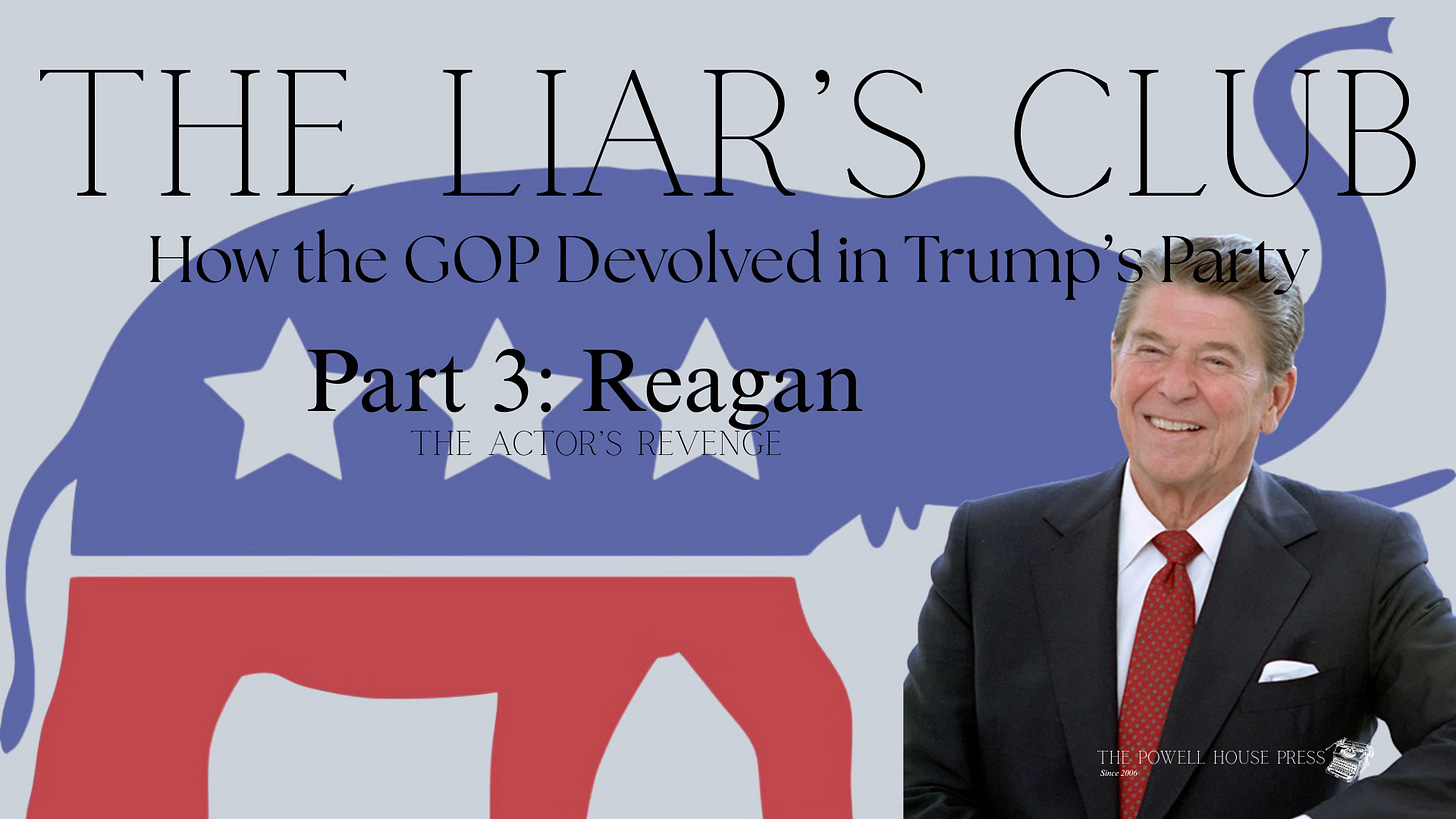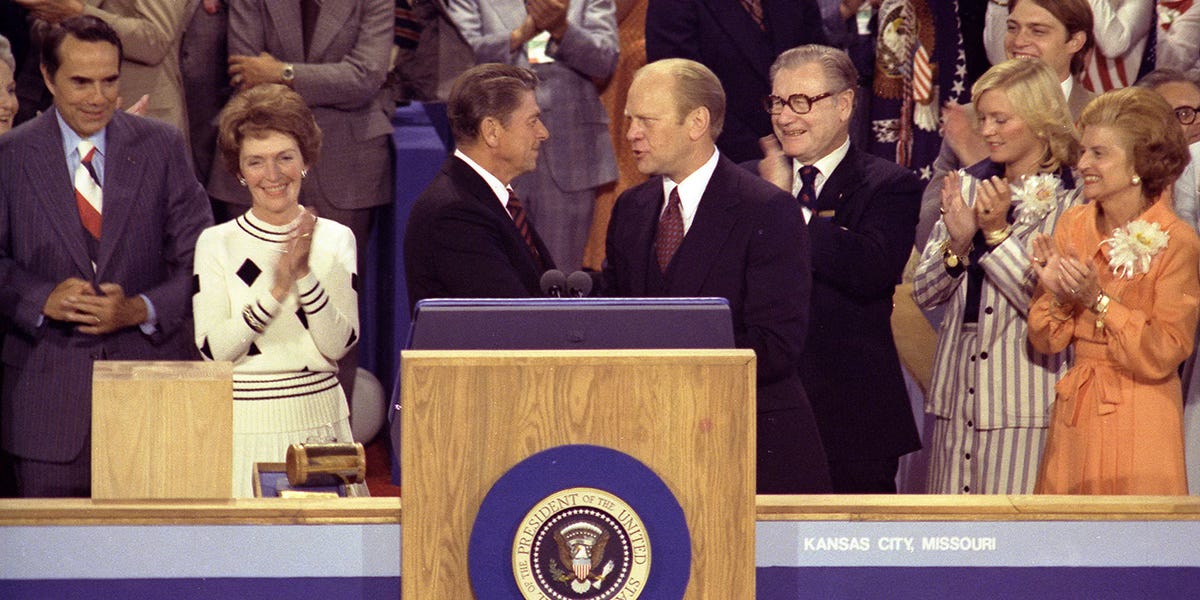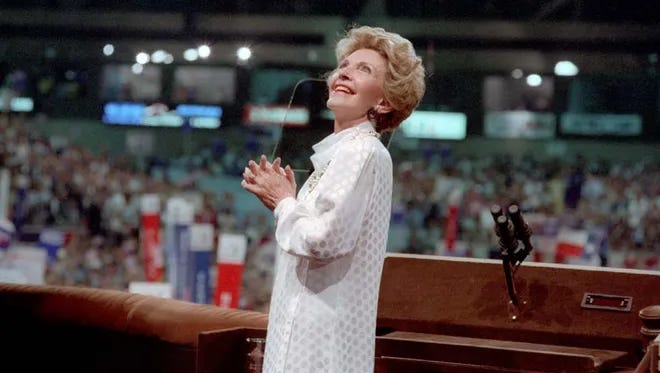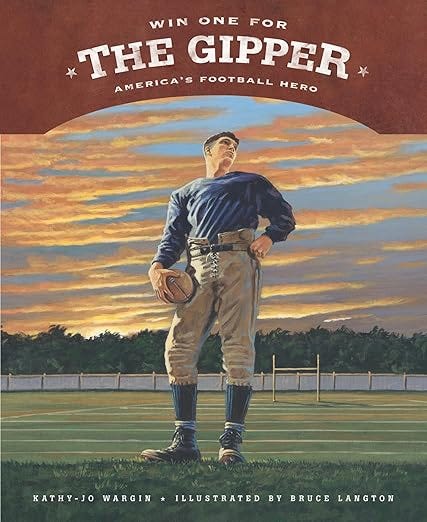The Grand Old Party: An Intimate Autopsy of how Paranoia, Prejudice, and Criminal Conspiracy Corroded American Democracy, One Year at a Time
Part Three: The Teflon President Who Made Genocide Camera-Ready and Cruelty Feel Like Morning in America
Note: This is part three of five articles examining the National Republican Party from Nixon to Trump and how lies, cheating, bullying and racism became the favorite tools of the GOP. You can read Part One on Nixon and Part Two on Ford by clicking the links.
Picture Ronald Wilson Reagan in 1976, standing at the podium of the Republican National Convention in Kansas City, having just lost the nomination to Gerald Ford by a whisker. The house lights catch the Brylcreem in his hair, that architectural marvel of male vanity that wouldn’t move in a hurricane. He’s sixty-five years old, ancient by political standards, but the makeup and lighting—always the makeup and lighting with Reagan—make him look like a mature leading man, which is exactly what he was.
Ford has just invited him to speak, a desperate gesture to heal the party he’d split like a ripe melon. Reagan takes the microphone and delivers an impromptu sermon about nuclear war and human survival that has delegates weeping into their Goldwater buttons. In that moment, everyone in the Kemper Arena knows they’ve nominated the wrong man. They’re watching Ford, that human paperweight, while the star glows in the wings. Four years later, they’d correct their mistake and unleash something far more dangerous than Nixon’s paranoid criminality or Ford’s enabling mediocrity: they’d elect an actor who would make American cruelty look like kindness, make devastation feel like morning, make the destruction of the poor seem like their own fault.
Reagan didn’t just continue the corruption Ford had enabled—he perfected it, gift-wrapped it, sold it with a wink and a smile that made Americans feel good about feeling nothing for their suffering neighbors. If Nixon was the criminal and Ford the enabler, Reagan was the magician who made the crime disappear even as he was committing it.
Nancy watched from the VIP box that night in Kansas City, her face a porcelain mask of practiced adoration, already calculating the comeback. She understood something the political establishment didn’t: Americans didn’t want truth, they wanted performance. They didn’t want complexity, they wanted cowboy movies. They didn’t want to face what they’d become, they wanted an actor to tell them they were wonderful just as they were, even as he picked their pockets and poisoned their children.
The myth-making began immediately. By the time Reagan announced for 1980, he’d been transformed from a B-movie actor who’d informed on his colleagues to the FBI into Moses himself, come down from the mountain to lead conservatives to the promised land. The fact that he’d been a New Deal Democrat until General Electric literally paid him to change his mind? Memory-holed. His presidency of the Screen Actors Guild when he was feeding names to HUAC? Ancient history. The messy divorce from Jane Wyman, who’d grown tired of his emotional absence? Never mentioned.
What they sold instead was the Gipper—that scene-stealing performance from “Knute Rockne, All American” where he dies young and beautiful, asking his team to “win one for the Gipper.” It was Reagan’s only memorable movie moment, and he’d spend the rest of his life reenacting it in various forms, always dying nobly for the cameras, always asking America to win one for him. The fact that George Gipp was a pool shark and a drunk who’d contracted strep throat from a prostitute? Well, darling, that didn’t fit the narrative.
The 1980 campaign was a masterclass in racial dog-whistling wrapped in sunny optimism. Reagan announced his candidacy in Philadelphia, Mississippi—not the one with the Liberty Bell, but the one where three civil rights workers had been murdered in 1964. Standing where James Chaney, Andrew Goodman, and Michael Schwerner had been lynched for the crime of registering Black voters, Reagan talked about “states’ rights.” The message was as subtle as a burning cross but delivered with that twinkly grandfather smile that made white suburbanites feel sophisticated rather than complicit.
His campaign manager, the reptilian Lee Atwater—who would later die of a brain tumor, proving that occasionally there is justice in the universe—perfected Nixon’s Southern Strategy for the television age. “You can’t say n****r anymore,” Atwater explained with the casualness of a man ordering coffee. “That backfires. So you say stuff like forced busing, states’ rights, and all that stuff. You’re getting so abstract now, you’re talking about cutting taxes, and all these things you’re talking about are totally economic things, and a byproduct of them is, Blacks get hurt worse than whites.”
Reagan delivered these abstractions with the timing of a professional actor. The welfare queen driving her Cadillac—a complete fiction based on one woman in Chicago who’d committed welfare fraud, transformed into an entire Black population gaming the system. The “strapping young buck” buying T-bone steaks with food stamps—another fantasy delivered with just enough indignation to make white voters feel their resentment was justified. This wasn’t racism, heavens no. This was just common sense, fiscal responsibility, morning in America.






